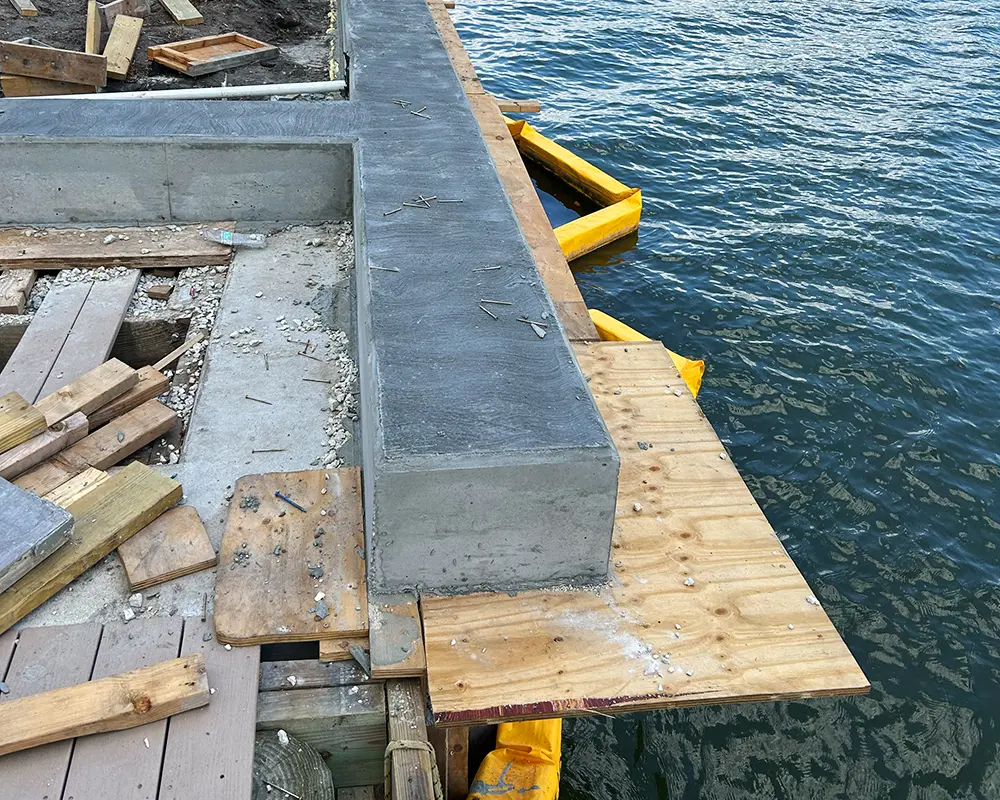“Florida loses up to 15 feet of shoreline during major storms.” That stat alone should get any waterfront homeowner’s attention.
Living in Bonita Springs and the greater Southwest Florida area means enjoying beautiful coastal views—but it also means battling constant erosion, saltwater exposure, and rising tides. Your seawall is your property’s first line of defense. Ignore it, and you’re leaving your investment vulnerable.
At Overall Outdoor & Marine Services, we’ve seen firsthand how proper seawall maintenance can extend the life of your waterfront—and how neglect leads to costly repairs. Below, we break down the essentials for protecting your property from erosion with a solid seawall maintenance plan.
Why Seawall Maintenance in Bonita Springs Matters
Bonita Springs is no stranger to storms, tides, or intense UV exposure. These environmental pressures weaken seawalls over time. Without regular maintenance, even the most well-built seawalls can crack, lean, or collapse.
Benefits of Regular Seawall Maintenance
- Prevent costly structural damage
- Maintain property value
- Ensure compliance with local regulations
- Extend the seawall’s lifespan
- Keep your family and waterfront safe
Common Signs Your Seawall Needs Attention
1. Visible Cracks or Leaning Sections
If you notice that parts of your seawall are starting to bow or crack, don’t wait. These are early signs that the structure is losing integrity.
2. Soil Loss Behind the Wall
Pockets of missing soil or sinkholes near the seawall could indicate water is seeping through—meaning your seawall is no longer doing its job.
3. Rust Stains
Rust stains can be a sign that the rebar inside your concrete seawall is corroding. Once this begins, it’s only a matter of time before structural problems follow.
4. Water Pooling or Drainage Issues
Water that doesn’t drain properly behind the seawall can increase pressure on the structure, causing failure over time.
How to Prevent Seawall Erosion in Florida
Seawall erosion in Florida is a constant battle, but a winnable one if you stay proactive.
Inspect Annually (Or After Every Major Storm)
At a minimum, inspect your seawall once a year. Look for cracks, exposed rebar, soil washout, or algae growth. After a hurricane or tropical storm, do a full checkup as part of your post-storm property inspection.
Maintain Weep Holes
Weep holes allow water behind the seawall to escape. If they’re clogged, pressure builds up and causes cracks. Keeping them clean is a small task that prevents big problems.
Install a Remediation Wall (When Needed)
If your seawall is nearing the end of its lifespan but hasn’t failed yet, a remediation wall—built just outside your existing seawall—can buy you more time and protect your property while you plan a full replacement.
Reinforce with Riprap
Riprap (large stones placed along the base) helps reduce wave energy and protects the wall from further wear. It’s especially useful in areas with heavy boat traffic or strong currents.
Florida Seawall Inspection Checklist
Here’s a simple checklist you (or your contractor) should use during a routine seawall inspection:
- Cracks in concrete or block
- Corroded or exposed rebar
- Soil washout behind the wall
- Misaligned capstones
- Leaning or bowed sections
- Algae or plant growth through joints
- Clogged or missing weep holes
- Signs of undermining (sinkholes, depressions)
- Water staining from reverse seepage
- Loose tie-back rods
Seawall Lifespan and Upkeep Tips
Most concrete seawalls in Florida last between 30–50 years with proper care. However, saltwater, poor drainage, and lack of maintenance can cut that number in half.
How to Maximize Lifespan:
- Schedule bi-annual inspections
- Replace or clean filters in weep holes
- Install drainage systems behind older seawalls
- Keep vegetation trimmed
- Avoid driving heavy equipment near the wall
- Reinforce early with riprap or a remediation wall
When to Call the Experts
It’s tempting to “keep an eye on it” and put off repairs. But that approach often ends with a collapsed seawall and tens of thousands in damage.
If your seawall is showing signs of wear or if you’re unsure about its condition, call a professional marine contractor like Overall Outdoor & Marine Services. We provide honest assessments and transparent pricing. Whether it’s a spot repair or a full rebuild, we’ll help you protect your investment—without the upsell.
We’ve even got helpful questions to ask your marine contractor about seawalls, and you can read more here.
Conclusion
In Bonita Springs and across Southwest Florida, a seawall isn’t just a nice feature—it’s a necessity. Taking the time to inspect and maintain your seawall now means peace of mind during storm season, and thousands saved down the line.
Ready to protect your shoreline?
Call Overall Outdoor & Marine Services at 239-322-2661 or contact us here for a free consultation. We’ve got the crew, the tools, and the experience to keep your waterfront safe and strong.

